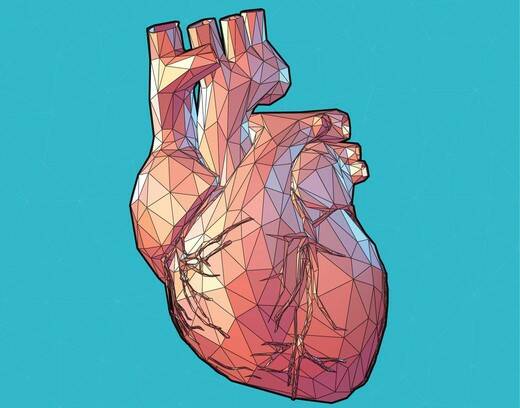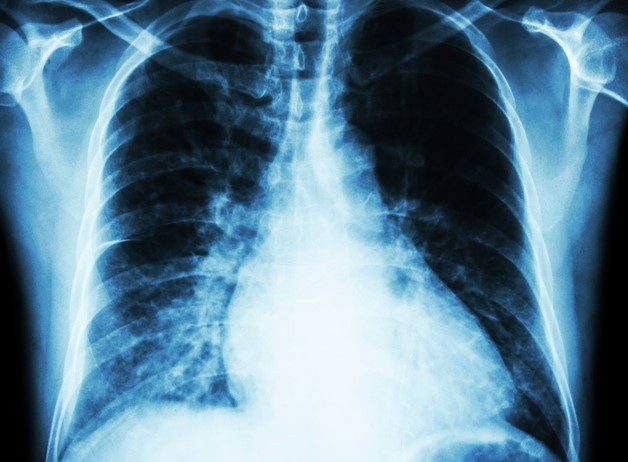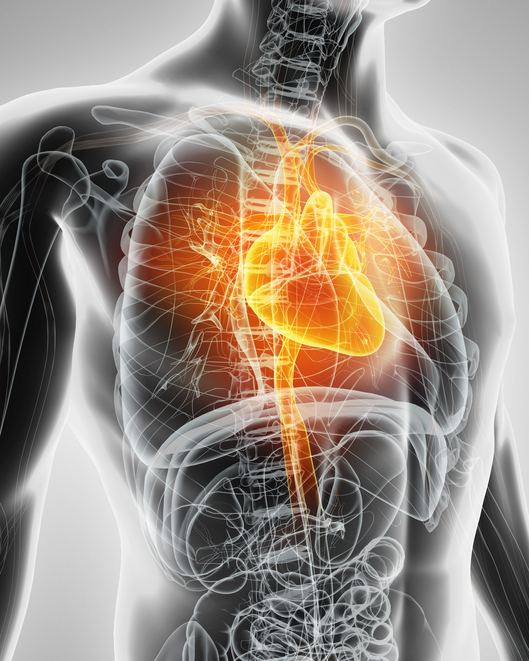Enlargement of the heart: because of a medical cause or because of sport? (Cardiomegaly)

In an athlete, this is a normal condition, when the heart has become accustomed to the increased need for blood supply to the muscles and the body. Another case is if the cause is a disease. It may be a problem with the cardiovascular, respiratory system. Heart enlargement also occurs in the case of alcoholism or after infections.
Heart enlargement (cardiomegaly) is a frequent component of cardiomyopathy. It is caused by cardiovascular and respiratory diseases, as well as diseases of the digestive tract and viruses.
In some cases, the heart is enlarged physiologically, i.e. naturally. It is a consequence of adaptation to prolonged and increased physical stress.
Classification of cardiomyopathies
Cardiomyopathy refers to damage to the heart muscle. It is divided into primary and secondary.
Primary cardiomyopathy arises from an unknown cause, whereas secondary cardiomyopathy has a known cause. This classification is given by the WHO (World Health Organization).

Another division divides cardiomyopathy into:
- hypertrophic (when there is an inadequate enlargement of the heart muscle and diastole, i.e. the filling of the heart with blood, is disturbed)
- dilated (enlargement of the ventricles with systolic dysfunction, i.e. impaired contraction of one or both ventricles)
- restrictive (when there is severe impairment of the filling function of the heart, i.e. diastole)
- arrhythmogenic dysplasia of the right ventricle of the heart (this is the gradual replacement of heart muscle by fat and connective tissue)
Read also: Cardiomyopathy
What are the symptoms of heart enlargement?
If the cardiomegaly is minor in extent, it does not have a significant effect on the function of the heart and may not be outwardly apparent. This is mainly at rest. It only becomes apparent with increased physical exertion.
This is not the case if the enlargement interferes with the function of the heart as a pump. In this case, symptoms can appear with minimal exertion or even at rest.
Symptoms that occur when the heart is enlarged:
- Fatigue
- weakness
- swelling of the lower limbs and later of the whole body
- weight gain, increase in waist circumference, swelling
- impaired breathing, shortness of breath during activity, talking, but also at rest
- heart palpitations, heart rhythm disturbances
- chest pain
How is it diagnosed?
In diagnosis, mainly imaging methods are used, namely X-ray and ECHO, which is actually an ultrasound examination. ECG is also partly involved in the detection.
Of course, the medical history also plays an important role. From this, the doctor learns information about fatigue, weakness and difficulty breathing on exertion or at rest. In some cases, an MRI is used, but also an endomyocardial biopsy.
What causes enlargement of the heart?

The heart enlargement itself is caused by a triggering cause. There can be several reasons. Examples include alcoholism, high blood pressure, various viral diseases, inflammation of the heart muscle, pulmonary embolism and other lung diseases.
Tip: Learn more about pulmonary embolism.
Enlargement of the heart is present as a characteristic symptom in hypertrophic cardiomyopathy. This is a primary disease of the heart muscle that is also accompanied by impaired cardiac function and a decreased ability to contract or dilate the myocardium.
In the heart, there is an enlargement of the ventricular septum between the right and left chambers of the heart. Sometimes this disease takes place without visible symptoms such as chest pain. This is dangerous because not treating this problem also leads to death.
Cardiovascular causes
Most often there is an enlargement of the left ventricle of the heart, less often of the right ventricle. It is a reaction of the heart muscle to pressure or volume overload of the heart. This condition is a symptom of various cardiovascular diseases, in the main representation is atherosclerosis and high blood pressure.
Thus, hypertrophy is also present due to increased blood pressure. This is also one of the most common cardiovascular diseases of the modern population. High blood pressure is also accompanied by unpleasant headaches and excessive fatigue, hot flashes.
It appears, of course, even if there are changes of atherosclerotic type. In addition to hypertension, the load on the left ventricle of the heart increases disproportionately. As a result, hypertrophy of this part of the heart occurs.
Enlargement of the left ventricle of the heart is also present as a result of problems with the aorta, for example, when the aortic valve is narrowed, the aorta itself is narrowed or the aortic or bicuspid valve is not closed sufficiently.
The heart wall itself is affected in a disease called endomyocardial fibrosis, in which functional tissue is replaced by affunctional tissue.
Other causes are also:
- coronary artery disease
- heart muscle infarction
- anaemia
- congenital heart defects
- myocarditis
- pericarditis and pericardial effusion
Interesting information: articles on myocardial infarction and coronary artery disease.
Pulmonary cause
On the other hand, the right ventricle of the heart tends to be enlarged when there is high pulmonary pressure, when the pulmonic valve is narrowed or due to insufficiency of the tricuspid valve. The right side of the heart is also more sensitive to volume overload of the heart with blood.
Examples of these diseases are:
- pulmonary fibrosis
- sarcoidosis
- cancer
- emphysema
- chronic obstructive pulmonary disease
Other causes of heart enlargement
Heart enlargement can also occur in haemochromatosis. It is caused by excessive deposition of iron in the tissues in the form of haemosiderin and ferritin. This disease can be acquired or congenital. It is manifested by an increase in the concentration of iron in the blood.
Other symptoms include excessive fatigue and also hyperpigmentation. The disease is most often treated by administering special preparations that are able to bind iron to themselves and prevent absorption in the intestine.
Another example where unwanted deposition is behind the enlargement of the heart is amyloidosis. This is a condition where amyloid, which is a product of certain proteins, is deposited in various organs. It can also be deposited in the heart.

Problems with an enlarged heart can also originate in the digestive system. For example, in alcoholism, liver problems occur. And the main cause is cirrhosis of the liver and portal hypertension.
Alcoholism has a negative and direct effect on the cardiovascular system and the heart muscle itself. It is a frequent cause of toxic cardiomyopathy. The damage it leaves on the cardiovascular system, on the digestive tract, and of course also on the nervous system and therefore directly on the brain.
Other toxic causes include drugs, especially long-term abuse of cocaine, crack, but also abuse of other addictive substances and certain drugs.
Obesity is also a complication and cause of multiple cardiovascular diseases. It is even a risk factor for atherosclerotic changes in the blood vessels, which also cause hypertrophy of the heart.
Dilated cardiopathy arises from other diseases, such as various viral diseases, as well as bacterial diseases such as Lyme disease. But it also arises from reduced immunity, such as in the case of HIV.
Heart enlargement can also be related to other diseases such as:
- thyroid dysfunction
- Fabry disease
- Pompe disease
- Beckwith-Wiedemann syndrome
- Lupus
- genetic factor
It also arises when the heart is subjected to prolonged increased physical activity, such as in athletes. The heart adapts physiologically and changes according to the long-term demands of increased blood supply to muscles and organs.
This process involves an increase in the size of the heart. Its cavities, especially the left ventricle, become larger. Its wall becomes thicker. The volume and overall weight of the heart increase. These dimensions are, however, still within the physiological range.
The opposite of this is pregnancy cardiomyopathy, a rare condition affecting approximately one in 15 000 pregnant women. It can manifest itself in heart failure around the time of delivery and occurs together with pre-eclampsia.
Video about hypertrophic karyomyopathy
Diseases with symptom "Heart enlargement"
- Aneurysm
- Atrial and ventricular septal defect
- Atrial fibrillation
- Cardiogenic shock
- Cardiomyopathy
- Congenital Cardiac Defects
- Endocarditis
- Heart Tumors
- Heart valve disease
- High Blood Pressure
- Hypothyroidism - reduced thyroid function
- Pulmonary embolism
- Pulmonary hypertension
- Thromboembolic disease
- Pituitary adenoma
- Pompe disease
Interesting resources










